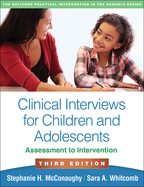Clinical Interviews for Children and Adolescents
Third Edition
Assessment to Intervention
Stephanie H. McConaughy and Sara A. Whitcomb
HardcoverPaperbacke-bookprint + e-book
Hardcover
orderDecember 13, 2021
ISBN 9781462548170
Price: $71.00 292 Pages
Size: 8" x 10½"
Paperback
orderJanuary 20, 2022
ISBN 9781462548163
Price: $47.00 292 Pages
Size: 8" x 10½"
e-book
orderNovember 20, 2021
PDF and Accessible ePub ?
Price: $47.00 292 Pages
ePub is Global Certified Accessible
print + e-book $94.00 $56.40
orderPaperback + e-Book (PDF and Accessible ePub) ?
Price: 292 Pages
ePub is Global Certified Accessible
The reproducible materials can be downloaded and printed in PDF format.
“Provides the reader with an excellent model for effective, real-life clinical problem solving with difficult child clinical cases....This volume and the clinical methods it presents serve as an excellent model for optimization of integrative psychological assessment with children and adolescents. Its widespread use as an academic text and as a manual for clinical practice is strongly encouraged.”

—PsycCRITIQUES (on the first edition)
“This book packs in a large amount of useful and user-friendly information....Provides invaluable, research-based clinical interview strategies, techniques, and theories for busy school psychologists and other practitioners in a format that is well-organized and easy to use.”

—NASP Communiqué (on the first edition)
“Graduate students will likely find the example interview questions, interview protocols, and case studies useful….This book provides a solid foundation for those interested in learning about child and adolescent clinical interviewing.”

—NASP Communiqué
“The third edition of this very practical book captures the true complexity of clinical interviewing. The book has been thoroughly updated to include the impact of technology on the everyday lives of children and adolescents, as well as recent scholarship related to diversity, gender identity, sexual behaviors, and substance use. The explanations of clinical interviewing are richly illustrated with six case examples that are revisited throughout the chapters. The interviewing strategies discussed are readily translated into practice, given the many included reproducible protocols. Throughout, McConaughy and Whitcomb's explanations ring true to their extensive experience as both scholars and mental health practitioners.”

—Beth Doll, PhD, Professor of Educational Psychology and Training Director, Nebraska Consortium for Internships in Professional Psychology, University of Nebraska-Lincoln
“This excellent third edition will doubtless remain the go-to book for practitioners who conduct clinical interviews or professors who teach in this area. There is not a topic in clinical interviewing that has not been covered. The book is easy to read, scholarly, and empirically justified, and has case examples emphasizing the main points. There is none other like it on the market.”

—Melissa A. Bray, PhD, Professor and Director, School Psychology Program, University of Connecticut
“A timely update to an authoritative guide. Updates in the third edition include coverage of virtual interviews, increased attention to bullying and victimization, and an expanded discussion of interviewing children from culturally and linguistically diverse backgrounds. Students in graduate courses on social–emotional assessment will be well served by having this text on their reading lists. Even experienced practitioners will find the book useful in expanding their skill sets, and will appreciate the valuable materials it contains, such as the revised Semistructured Student Interview. Interviewing is an essential skill for school-based practitioners, and I can think of no better foundational text than this welcome third edition.”

—Robert J. Volpe, PhD, Department of Applied Psychology, Northeastern University
—PsycCRITIQUES (on the first edition)
“This book packs in a large amount of useful and user-friendly information....Provides invaluable, research-based clinical interview strategies, techniques, and theories for busy school psychologists and other practitioners in a format that is well-organized and easy to use.”
—NASP Communiqué (on the first edition)
“Graduate students will likely find the example interview questions, interview protocols, and case studies useful….This book provides a solid foundation for those interested in learning about child and adolescent clinical interviewing.”
—NASP Communiqué
“The third edition of this very practical book captures the true complexity of clinical interviewing. The book has been thoroughly updated to include the impact of technology on the everyday lives of children and adolescents, as well as recent scholarship related to diversity, gender identity, sexual behaviors, and substance use. The explanations of clinical interviewing are richly illustrated with six case examples that are revisited throughout the chapters. The interviewing strategies discussed are readily translated into practice, given the many included reproducible protocols. Throughout, McConaughy and Whitcomb's explanations ring true to their extensive experience as both scholars and mental health practitioners.”
—Beth Doll, PhD, Professor of Educational Psychology and Training Director, Nebraska Consortium for Internships in Professional Psychology, University of Nebraska-Lincoln
“This excellent third edition will doubtless remain the go-to book for practitioners who conduct clinical interviews or professors who teach in this area. There is not a topic in clinical interviewing that has not been covered. The book is easy to read, scholarly, and empirically justified, and has case examples emphasizing the main points. There is none other like it on the market.”
—Melissa A. Bray, PhD, Professor and Director, School Psychology Program, University of Connecticut
“A timely update to an authoritative guide. Updates in the third edition include coverage of virtual interviews, increased attention to bullying and victimization, and an expanded discussion of interviewing children from culturally and linguistically diverse backgrounds. Students in graduate courses on social–emotional assessment will be well served by having this text on their reading lists. Even experienced practitioners will find the book useful in expanding their skill sets, and will appreciate the valuable materials it contains, such as the revised Semistructured Student Interview. Interviewing is an essential skill for school-based practitioners, and I can think of no better foundational text than this welcome third edition.”
—Robert J. Volpe, PhD, Department of Applied Psychology, Northeastern University



